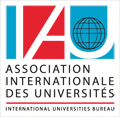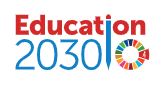UNESCO Bangkok Office: Sustainability Begins with Teachers
News / Actualités

UNESCO Bangkok Office: Sustainability Begins with Teachers
Presentations from the Integrating Education for Sustainable Development (ESD) in Teacher Education in South-East Asia Project Review Workshop - 24-26 April 2018, Bangkok, Thailand - are now online. Meant to review the project “Sustainability Begins with Teachers” and highlight the crucial role teachers play in facilitating social change towards sustainable futures and supporting global efforts to attain the SDGs, the event resulted in the creation of a Southeast Asia Education for Sustainable Development (ESD) teacher educators’ network.
A Southeast Asia Education for Sustainable Development (ESD) teacher educators’ network was created at a workshop organized by UNESCO from 24 to 26 April 2018 in Bangkok, Thailand. The workshop was designed to review the project Sustainability Begins with Teachers, which has been implemented in cooperation with Southeast Asia Ministers of Education Organization (SEAMEO) with the generous support of the Government of Japan. The project highlights the crucial role teachers play in facilitating social change towards sustainable futures and supporting global efforts to attain the SDGs, most notably SDG 4 Target 7. In total 26 universities and teacher education institutions in Southeast Asia participated in the project.
Over the last year, the project participants undertook numerous actions to integrate ESD in teacher education. At the workshop in Bangkok, educators representing 18 institutions in Cambodia, Indonesia, Lao PDR, Philippines and Thailand came together and reported on their achievements. For example, in Lao PDR at Luang Prabang Teacher Training College, a mechanism for waste management was put in place, and volunteer student groups were created to maintain the campus environment. In Cambodia, the Faculty of Education of the Royal University of Phnom Penh worked with students to change all standard street lighting to solar-powered lighting, as well as to clean wastewater using a plant and solar powered oxygenation process. In the Philippines, Cebu Technological University, in cooperation with the University of San Jose Recoletos, mobilized the whole university to plan for integrating ESD into ongoing extension projects including those for literacy and skills training and community building. In Indonesia, the Universitas Gadjah Mada organized an ESD workshop which allowed teacher education institutions in Yogyakarta to better understand ESD and join various community movements such as the River Restoration Movement and Rain Water Harvesting Movement. In Thailand, the Faculty of Education of Chulalongkorn University held a workshop with a university in U.S. for their graduate students to analyze common issues from environmental, social and economic perspectives.
The project resulted in the successful networking of Southeast Asian teacher educators who are committed to promoting ESD in their communities and countries across Southeast Asia. As a participant from the Philippines noted: “Because of this project, I was able to meet all of you and establish a network of ESD advocates”. The participants made plans for further integrating ESD in their institutions and their programmes, including a number of collaborative initiatives.
The participants left with a desire to expand and grow their ESD networks, empowered to carry on ESD actions in each of their communities through a holistic approach.
The workshop demonstrated that the project was successful in planting the seeds of change for ESD, which will continue to grow across Southeast Asia. As a participant from Indonesia noted, “We are doing real action for a sustainable life, and taking responsibilities for present and future generations”.

 INGO with UNESCO Associate Status / ECOSOC Consutative Status
INGO with UNESCO Associate Status / ECOSOC Consutative Status